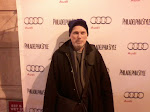SOMEBODY THOUGHT THEY KNEW SOMETHING ONCE
Suddenly at the University of Chicago I discovered I could no longer tolerate literary criticism. I had noticed that anthologies of poetry and anthologies of art criticism seemed to have the same authors--Ashbery, Benedikt, Schjeldahl, O’Hara, et cetera--and all these writers seemed to live in New York. So I transferred to Columbia and decided to interview poets for my dissertation. Why not? Sexual Politics by Kate Millet had been a Columbia dissertation.
What is literature? Pound fortunately died before I was to interview him, but W.H. Auden was around, and I therefore had to interview him. But there had been many books about Auden. One friend won a huge scholarship to write on James Joyce. But after a few years, he went mad. Too much to read.
Aside from Auden, the other poets were in their forties; there had been reviews and profiles but no studies. Fortunately I was able to finesse Auden; he was from an older generation and, unlike the younger poets, wouldn’t allow a tape recorder. His interview had no introduction, no annotated bibliography. Let’s face it, anyway--literature since Byron has been dominated by fiction. Novels portray race, class, gender, war and social upheaval. I rarely read novels. I write brief articles on living poets and art criticism for money. In 30 years my Unmuzzled OX published two short stories and one literary essay.
I find philosophical interpretations of poetry difficult to read. My psychoanalyst translated the pre-eminent living European philosopher. I didn’t know this. Psychoanalysis was itself boring; I underwent analysis to please my wife. After six months I happened to pick up a book by the preeminent European philosopher, and saw that my sleepy-headed bore of a psychoanalyst had translated it. I bought the book, and read it avidly, and hated it. At our next session I mentioned I had discovered his other job. He asked, What did you think of my book?
*
Wednesday was my first fully functional day back in New York. I couldn't really face yesterday, and basically stayed in bed. So I was up early today. When I'm having a hard time knocking the world into focus, for some reason, Butler’s The Lives of the Saints helps. Wednesday it was Paul. Today it's Thomas Aquinas, the older contemporary of Dante. They never met. But Thomas’ scholastic Summa seems equivalent to Dante's Commedia. They both thought everything essentially was knowable.
At least somebody thought they knew something once.
What is literature? Pound fortunately died before I was to interview him, but W.H. Auden was around, and I therefore had to interview him. But there had been many books about Auden. One friend won a huge scholarship to write on James Joyce. But after a few years, he went mad. Too much to read.
Aside from Auden, the other poets were in their forties; there had been reviews and profiles but no studies. Fortunately I was able to finesse Auden; he was from an older generation and, unlike the younger poets, wouldn’t allow a tape recorder. His interview had no introduction, no annotated bibliography. Let’s face it, anyway--literature since Byron has been dominated by fiction. Novels portray race, class, gender, war and social upheaval. I rarely read novels. I write brief articles on living poets and art criticism for money. In 30 years my Unmuzzled OX published two short stories and one literary essay.
I find philosophical interpretations of poetry difficult to read. My psychoanalyst translated the pre-eminent living European philosopher. I didn’t know this. Psychoanalysis was itself boring; I underwent analysis to please my wife. After six months I happened to pick up a book by the preeminent European philosopher, and saw that my sleepy-headed bore of a psychoanalyst had translated it. I bought the book, and read it avidly, and hated it. At our next session I mentioned I had discovered his other job. He asked, What did you think of my book?
*
Wednesday was my first fully functional day back in New York. I couldn't really face yesterday, and basically stayed in bed. So I was up early today. When I'm having a hard time knocking the world into focus, for some reason, Butler’s The Lives of the Saints helps. Wednesday it was Paul. Today it's Thomas Aquinas, the older contemporary of Dante. They never met. But Thomas’ scholastic Summa seems equivalent to Dante's Commedia. They both thought everything essentially was knowable.
At least somebody thought they knew something once.


0 Comments:
Post a Comment
Subscribe to Post Comments [Atom]
<< Home